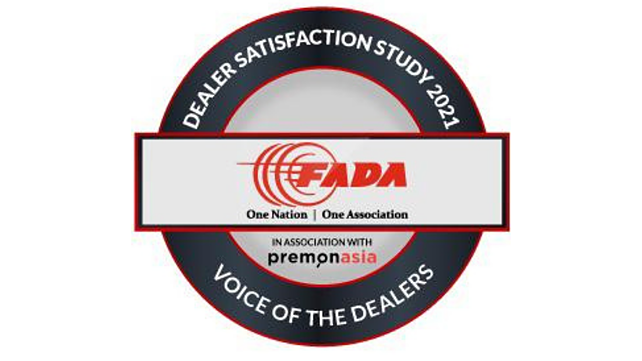
The automotive industry has been one of the sectors hit hardest by the pandemic. With vehicle buying falling across the country, the pressure on dealerships has been significant. In such a scenario, it is not surprising that viability of dealerships has come across as the biggest concern of auto dealers across all segments of the industry in FADA’s latest Dealer Satisfaction Study 2021.
Beyond the fundamental needs of dealership viability, support on sales & aftersales, openness to dealer inputs in decision making, and designing long term policies, Vinkesh Gulati, President, Federation of Automobile Dealers Associations said there is a need to have technology solutions and analytics to intelligently mine transaction data for business gains.
At the overall industry level, dealers attached high importance of 27% on business viability, making it a highly critical aspect where OEMs need to exhibit greater sensitivity, particularly since the current satisfaction level on this factor is weak, noted the study.
“There are clear signs that dealers expect their respective OEMs to go beyond the fundamental needs,” he said at the release of the study undertaken in association with PremonAsia, a consumer-insight led consulting & advisory firm based out of Singapore.
Dealers and OEMs jointly invest in various marketing activities, and they need a platform that can help them measure marketing performance accurately. Gulati said, “Creating a digital platform to measure the effectiveness of marketing expenditure is reflective of a changing mind-set.”
He further said there was a unanimous decision that OEMs should involve dealers in policy making. Regional office teams should bring the voices of dealers into headquarters, who should attempt to address their issues at a policymaking level. Dealers also demand freedom in running their businesses, especially from a productivity perspective, said Gulati.
The study was divided into six factors: viability & policy, product, marketing, sales, after-sales and training. These were further broken down into 70 different attributes to get accurate results. Each of these six factors had a maximum score of 1,000 points.
In terms of viability & policy, the industry achieved an average score of 604; while in after-sales, the industry average was 670. The average score in terms of sales was 660, while the marketing aspect had the lowest average score of 650. Product factor got the highest average score of 742, while the training aspect got an average score of 698.
Findings among OEMs
The overall dealer satisfaction index reported an industry average of 657 points, with the four-wheeler mass market and luxury segments scoring above the industry average with 720 points and 678 points respectively. The two-wheeler segment scored 626, CVs scored 621 and 3Ws scored the lowest of 610 on a scale of 1,000 points.
The 2021 study saw South Korean carmaker KIA India enter the rankings at the top position with 879 points in the four-wheeler mass market segment. In the luxury car segment, BMW India and Mercedes-Benz India scored 707 points each to grab the top slot. Fellow German manufacturer Audi India followed with 649 points.
In the two-wheeler segment, Japanese manufacturer Honda Motorcycle and Scooter India (HMSI) scored 693 points to take top honour, which is significantly higher than Hero MotoCorp’s 627 points.
The three-wheeler segment saw a closer fight between top ranked Bajaj Auto (620 points) and second-placed Piaggio Auto with 610 points.
VECV-Eicher Motors ranked first among commercial vehicle manufacturers with a dealer satisfaction score of 669. The gap between second and third-placed was significantly smaller with Mahindra scoring 638 points and Tata scoring 630 points.
The other winners in each segment include:
| 4-Wheelers Mass Market Segment | Kia India – 879 points |
| MG Motors and Toyota Kirloskar Motor – 778 points | |
| Renault – 767 points | |
| 4-Wheeler Luxury Segment | BMW and Mercedes-Benz – 707 points |
| Audi – 649 points | |
| Land Rover – 645 points | |
| 2-Wheeler | Honda Motorcycle & Scooter India – 693 points |
| Hero MotoCorp – 627 points | |
| TVS Motors – 606 points | |
| 3-Wheeler | Bajaj Auto – 620 points |
| Piaggio Vehicles – 610 points | |
| Commercial Vehicle Segment | VECV-Eicher Motors – 669 points |
| Mahindra – 638 points | |
| Tata Motors – 630 points |
KIA India makes a mark
One of the youngest manufacturers in India, KIA motors was also awarded the best of the best manufacturer in terms of dealership satisfaction. Rajeev Lochan, Founder & CEO, PremonAsia said the company has done extremely well on all the six factors of the survey.
Other than that, KIA has done well where other manufacturers have weakened. For the most part, they are profitable and the dealers have rated KIA well on overall profitability and profitability concerns. KIA dealers get higher profit margins compared to other OEMs. “Not only are Kia’s dealers satisfied on most of the hygiene needs, but they are also truly delighted with the product and their business viability,” Lochan said.
The other advantage for Kia dealers is the shorter delivery time, which in turn helps in quick turnarounds, thus increasing the flow of money. All these aspects together make the Kia dealers satisfied with the OEM thus granting it the highest score.
Conclusion
The FADA study received over 2,000 participants across dealer principals and CEOs. There was fair participation from every corner of the country, including the suburbs and the countryside, said FADA. The study aimed to find common issues OEM distributors face across the industry. This year, FADA noticed some gaps against previous dealer satisfaction studies and therefore took the step to conduct the dealership survey, which will be an annual activity from now on.